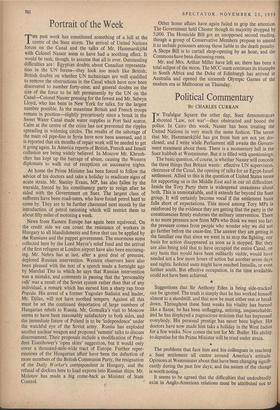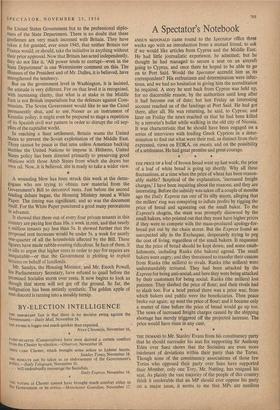Political Commentary
BY CHARLES CURRAN IN Trafalgar Square the other day, Suez demonstrators shouted 'Law, not war'—then obstructed and booed the police. In Cairo this week, Nasser has been treating the United Nations in very much the same fashion. The terms that Mr. Hammarskjold has got from him are not yet dis- closed; and I write while Parliament still awaits the Govern- ment statement about them. There is a momentary lull in the Suez hubbub at Westminster. But it is filled with questionings.
The basic question, of course, is whether Nasser will concede the three things that Britain wants : effective UN supervision, clearance of the Canal, the opening of talks for an Egypt-Israel settlement. Allied to this is the question of United States terms for supporting us in the Middle East and in our oil difficulties. Inside the Tory Party there is widespread uneasiness • about both. This is unmistakable, and it extends far beyond the Suez group. It will certainly become vocal if the settlement basis falls short of expectations. This mood among Tory MPs is reinforced by the evidence they are getting that the party in the constituencies firmly endorses the military intervention. There is no more pressure now from MPs who think we went too far; the pressure comes from people who wonder why we did not go farther before the cease-fire. The answer they are getting is the familiar one that since we went in to stop the fighting, our basis for action disappeared as soon as it stopped. But they are also being told that to have occupied the entire Canal, on any basis that would have been militarily viable, would have needed not a few more hours of action but another seven days and nights. Isolated units might have reached Ismailia, or even farther south. But effective occupation, in the time available, could not have been achieved.
Suggestions that Sir Anthony Eden is being side-tracked can be ignored. The truth is simply that he has worked himself almost to a standstill, and that now he must either rest or break down. Throughout these Suez weeks his vitality has burned like a flame; he has been unflagging, untiring, unquenchable; and he has displayed a pugnacious stoicism that has impressed everybody. His personal prestige has never been higher. His doctors have now made him take a holiday in the West Indies for a few weeks. Now comes the test for Mr. Butler. His ability deputise for the Prime Minister will be tried under strain.
The problems that face him and his colleagues in reaching a Suez settlement all centre around America's attitude. Opinions at Westminster about that have been changing signifi- cantly during the past few days; and the nature of the change is worth noting.
It seems to be agreed that the difficulties that undoubtedly exist in Anglo-American relations must be attributed not to the United States Government, but to the professional diplo- mats of the State Department. There is no doubt that these gentlemen are very much incensed with Britain. They have taken it for granted, ever since 1945, that neither Britain nor France would, or should, take the initiative in anything without their prior approval. Now that Britain has acted independently, they do not like it. 'All power tends to corrupt—even in the State Department' is one Westminster comment on this. The Illnesses of the President and of Mr. Dulles, it is believed, have strengthened the tendency.
But on the government level in Washington, it is insisted, the attitude is very different. For on that level it is recognised, With increasing clarity, that what is at stake in the Middle East is not British imperialism but the defences against Com- munism. The Soviet Government would like to see the Canal permanently shut, and to use. Nasser as an instrument of Kremlin policy; it might even be prepared to stage a repetition of its Spanish civil war pattern in order to disrupt the oil sup- plies of the capitalist world.
In reaching a Suez settlement, Britain wants the United States to prevent the.Soviet exploitation of the Middle East. There cannot be peace in that area unless American backing enables the United Nations to impose it. Hitherto, United States policy has been directed primarily to preserving good relations with those Arab States from which she draws her own oil. Now, it is believed, she is ready to take a wider view.
A wounding blow has been struck this week at the dema- gogues who are trying to obtain raw material from the Government's Bill to decontrol rents. Just before the second reading debate began, the Housing Ministry issued a White Paper. The timing was significant; and so was the document nself. For the White Paper punctured a good many perorations In advance.
It showed that three out of every four private tenants in this country are paying less than 10s. a week in rent, and that nearly a million tenants pay less than 5s. It showed further that the proposed rent increases would be under 5s. a week for nearly one-quarter of all the households affected by the Bill. These figures have made rabble-rousing ridiculous. In face of them, it !s idle to argue that higher rents in order to pay for repairs are Inequitable—or that the Government is plotting to exploit tenants on behalf of landlords.
Mr. Sandys, the Housing Minister, and Mr. Enoch Powell, his Parliamentary Secretary, have refused to quail before the promised Socialist storm over rents. It now begins to look as though that storm will not get off the ground. So far, the Indignation has been entirely synthetic. The golden apple of rent discord is turning into a mouldy turnip.











































































 Previous page
Previous page